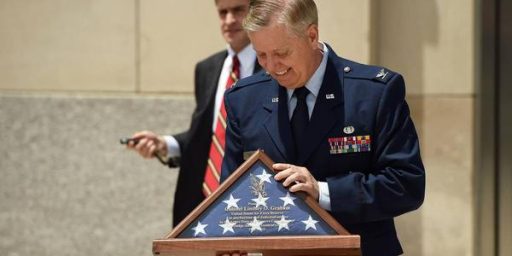SECRET COLLABORATORS
A very interesting report from Time Magazine:
Saddam Hussein didn’t want to believe what his intelligence networks were saying. Before the war last spring, says a former colonel in the Iraqi intelligence service, Saddam’s analysts presented him with classified reports predicting a decisive U.S. victory. The documents described how the Iraqi security forces, already outmatched, had been undermined by Washington’s success in recruiting Iraqi spies and double agents. Internal intelligence reported to Saddam that Iraq’s defenses would probably collapse. “We diplomatically suggested he should not stay here,” the colonel says, “because we couldn’t tell him outright that he had to step down.” Even as U.S. troops moved into his capital, Saddam struck a resilient pose, appearing on Iraqi TV one day wading through a worshipful Baghdad crowd, grinning broadly, pumping his fist in the air, stopping to kiss a child.
Five days later, the Iraqi leader could no longer keep up his staunch facade. His orders largely unheeded, his soldiers declining to fight, Saddam went out for a look at his falling capital, a secretary who accompanied him recalls. Saddam stood on Zaitun Street, the boulevard decorated with monumental statues of two muscular forearms holding swords that cross above the roadway. As he turned to leave, he paused. Using an Arabic expression of utter disillusionment, he muttered, “Even my clothes have betrayed me.”
Indeed, the quick and relatively painless U.S. overthrow of Saddam’s regime was achieved not just by military means but also by betrayal. Before a shot was fired, the U.S. recruited and dispatched Iraqi collaborators to uncover Saddam’s plans and capabilities, and hobble them. Deals were done; psychological warfare was waged; money was paid; and even blackmail was used. While the Bush Administration’s post-Saddam planning has proved wanting, in this area of prewar thinking, Washington’s strategies paid off. By the time the first U.S. tanks crossed the Kuwaiti border, top Republican Guard officers had been won over, and the secret police had been penetrated. Spies had infiltrated, and spotters had been dispatched to help guide American bombs. “You’d be surprised at what these guys achieved,” says a Pentagon official in Iraq, referring to the Iraqi collaborators.
Even if Saddam was the last to know, many of those in his inner circle understood how deeply the Iraqi security services had been penetrated. At a funeral for two junior military officers midway through the war, mourners asked the commanders present how things were going. “They told us we were losing,” one mourner remembers, “that there was a kind of treason in the army and the Republican Guard.”
Very, very interesting. Go read the whole thing; it’s not very long but I don’t want to post it all here.






If Saddams intelligence services were so thoroughly compromised why didn’t we have much more accurate information on the status of his WMD’s? Or did we?